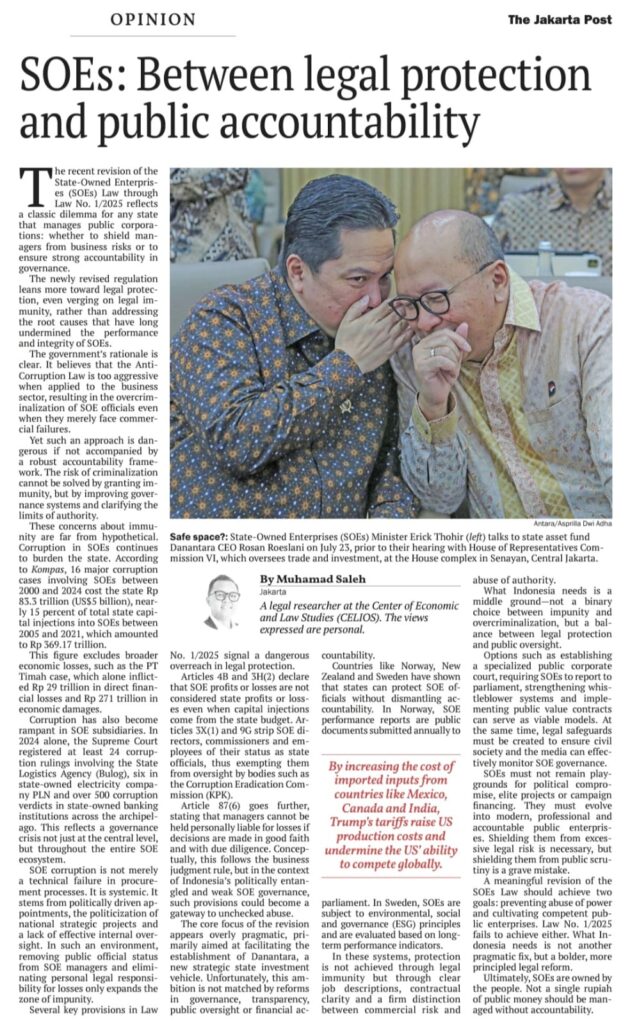The recent revision of the State-Owned Enterprises (SOEs) Law through Law No. 1/2025 reflects a classic dilemma for any state that manages public corporations: whether to shield managers from business risks or to ensure strong accountability in governance. The newly revised regulation leans more toward legal protection, even verging on legal immunity, rather than addressing the root causes that have long undermined the performance and integrity of SOEs. The government’s rationale is clear. It believes that the Anti-Corruption Law is too aggressive when applied to the business sector, resulting in the overcriminalization of SOE officials even when they merely face commercial failures.
Yet such an approach is dangerous if not accompanied by a robust accountability framework. The risk of criminalization cannot be solved by granting immunity, but by improving governance systems and clarifying the limits of authority. These concerns about immunity are far from hypothetical. Corruption in SOEs continues to burden the state. According to Kompas, 16 major corruption cases involving SOEs between 2000 and 2024 cost the state Rp 83.3 trillion (US$ 5 billion), nearly 15 percent of total state capital injections into SOEs between 2005 and 2021, which amounted to Rp 369.17 trillion.
This figure excludes broader economic losses, such as the PT Timah case, which alone inflicted Rp 29 trillion in direct financial losses and Rp 271 trillion in economic damages. Corruption has also become rampant in SOE subsidiaries. In 2024 alone, the Supreme Court registered at least 24 corruption rulings involving the State Logistics Agency (Bulog), six in state-owned electricity company PLN and over 500 corruption verdicts in state-owned banking institutions across the archipelago.
This reflects a governance crisis not just at the central level, but throughout the entire SOE ecosystem. SOE corruption is not merely a technical failure in procurement processes. It is systemic. It stems from politically driven appointments, the politicization of national strategic projects and a lack of effective internal oversight. In such an environment, removing public official status from SOE managers and eliminating personal legal responsibility for losses only expands the zone of impunity. Several key provisions in Law No. 1/2025 signal a dangerous overreach in legal protection.
Articles 4B and 3H(2) declare that SOE profits or losses are not considered state profits or losses even when capital injections come from the state budget. Articles 3X(1) and 9G strip SOE directors, commissioners and employees of their status as state officials, thus exempting them from oversight by bodies such as the Corruption Eradication Commission (KPK). Article 87(6) goes further, stating that managers cannot be held personally liable for losses if decisions are made in good faith and with due diligence. Conceptually, this follows the business judgment rule, but in the context of Indonesia’s politically entangled and weak SOE governance, such provisions could become a gateway to unchecked abuse.
The core focus of the revision appears overly pragmatic, primarily aimed at facilitating the establishment of Danantara, a new strategic state investment vehicle. Unfortunately, this ambition is not matched by reforms in governance, transparency, public oversight or financial accountability. Countries like Norway, New Zealand and Sweden have shown that states can protect SOE officials without dismantling accountability. In Norway, SOE performance reports are public documents submitted annually to parliament. In Sweden, SOEs are subject to environmental, social and governance (ESG) principles and are evaluated based on long-term performance indicators. In these systems, protection is not achieved through legal immunity but through clear job descriptions, contractual clarity and a firm distinction between commercial risk and abuse of authority. What Indonesia needs is a middle ground – not a binary choice between impunity and overcriminalization, but a balance between legal protection and public oversight.
Options such as establishing a specialized public corporate court, requiring SOEs to report to parliament, strengthening whistleblower systems and implementing public value contracts can serve as viable models. At the same time, legal safeguards must be created to ensure civil society and the media can effectively monitor SOE governance. SOEs must not remain playgrounds for political compromise, elite projects or campaign financing. They must evolve into modern, professional and accountable public enterprises. Shielding them from excessive legal risk is necessary, but shielding them from public scrutiny is a grave mistake.
A meaningful revision of the SOEs Law should achieve two goals: preventing abuse of power and cultivating competent public enterprises. Law No. 1/2025 fails to achieve either. What Indonesia needs is not another pragmatic fix, but a bolder, more principled legal reform. Ultimately, SOEs are owned by the people. Not a single rupiah of public money should be managed without accountability. –
Muhamad Saleh, The writer is a legal researcher at the Center of Economic and Law Studies (CELIOS). The views expressed are personal.
This article was published in thejakartapost.com with the title “”. Click to read: https://www.thejakartapost.com/opinion/2025/08/05/state-owned-enterprises-between-legal-protection-and-public-accountability.html.

